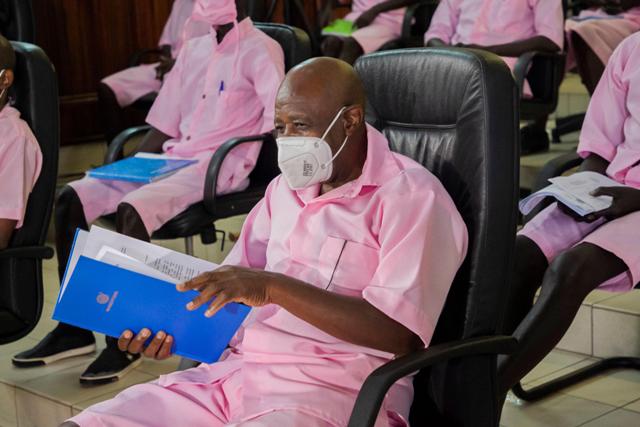 Paul Rusesabagina sits in a courtroom in Kigali, Rwanda, on 17 February, 2021. [photo: Credit Cyril Ndegeya/ Xinhua/ Alamy]
Paul Rusesabagina sits in a courtroom in Kigali, Rwanda, on 17 February, 2021. [photo: Credit Cyril Ndegeya/ Xinhua/ Alamy]
The Rwandan man portrayed as a hero in the Hollywood film about his efforts to save 1,268 people during the country’s genocide in 1994 has been convicted of terrorism after what has been described as a ‘show trial’ in the capital, Kigali. Paul Rusesabagina, 67, the former hotel manager played by Don Cheadle in the Oscar-nominated film Hotel Rwanda, was sentenced to 25 years in prison for backing a rebel group, the National Liberation Front (FLN), which is accused of killing nine Rwandans in attacks in 2018-19.
Rusesabagina’s family said he had been ‘kidnapped’ in Dubai last August and ‘taken by extraordinary rendition to Rwanda’. But the court in Kigali heard that a Burundian cleric and former ally, Constantin Niyomwungere, had tricked him on to a private plane that Rusesabagina thought was flying to Burundi but in fact took him to Rwanda. Paul Kagame, the Tutsi rebel commander who became Rwanda’s president after his forces captured Kigali and halted the genocide, in which some 800,000 people were killed, denied that Rusesabagina was forced to go to Rwanda and compared his journey to dialling a wrong number.
Kagame was the ‘darling of guilt-ridden Western countries’ after the genocide, according to the New York Times. In 2009 the former British prime minister Tony Blair praised his ‘good friend Paul Kagame. It is through his visionary leadership that Rwanda has become the African success story it is today, a country moving in the right direction at a remarkable pace.’
However, the NYT added: ‘Now, Rwanda is also known as an authoritarian state where Mr Kagame exerts total control, his troops are accused of plunder and massacres in neighbouring Congo, and political rivals are imprisoned, subjected to sham trials or die in mysterious circumstances.’ Human Rights Watch has documented ‘numerous cases of arbitrary arrests, detentions, prosecutions, killings, torture, enforced disappearances, threats, harassment, and intimidation against government opponents and critics.’
After leaving Rwanda for Belgium in 1996, Rusesabagina moved to the US in 2009, complaining of harassment by Rwandan agents and that he had been repeatedly burgled and had important documents stolen. After Hotel Rwanda was released in 2005, he was awarded the Presidential Medal of Freedom, the highest civilian US honour, but some survivors disputed his role during the massacres, while others accused him of genocide denial.
Rusesabagina became increasingly critical of Kagame and in 2006 he founded an opposition group in exile, the Rwanda Movement for Democratic Change (MRCD). In 2018 he said on video: ‘The time has come for us to use any means possible to bring about change in Rwanda as all political means have been tried and failed.’ The New Times, a pro-Kagame newspaper, called Rusesabagina ‘political head’ of the MRCD’s armed wing, the FLN, and ‘mastermind of the atrocities’.
Michela Wrong, author of a recent book about the Kagame regime, Do Not Disturb, told Al Jazeera: ‘This seems like a show trial, which is really aimed at silencing dissent … The verdict is making clear to people who are in the diaspora and criticising Kagame that the government can get them wherever they are.’
Geoffrey Robertson QC, who monitored the case for the Clooney Foundation for Justice, asked in June: ‘Has the court in Rwanda predetermined Mr Rusesabagina’s guilt?’ His TrialWatch report concluded: ‘This so-called trial is not a real adversarial proceeding: it has become a spectacle in which the state’s version of events is not allowed to be challenged. Any conviction that emerges from it cannot be considered credible.’



